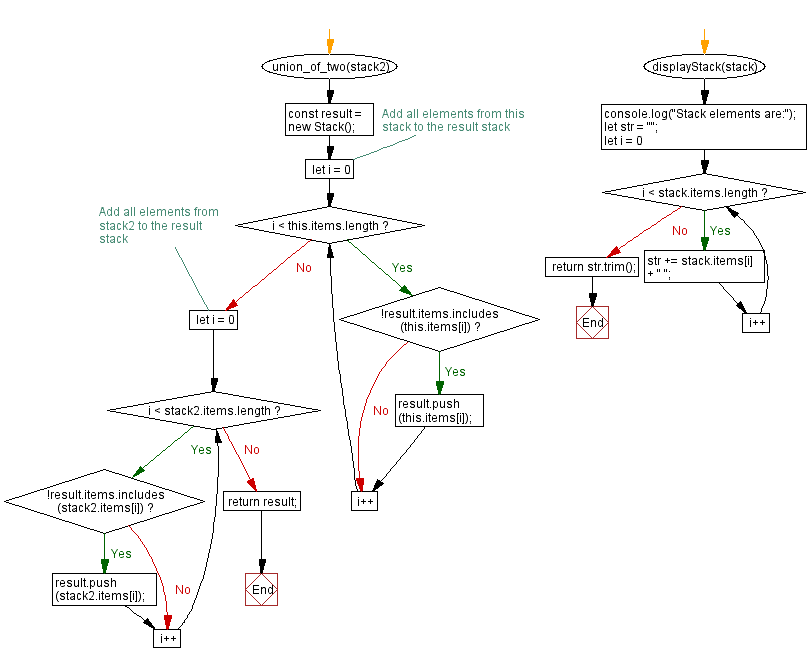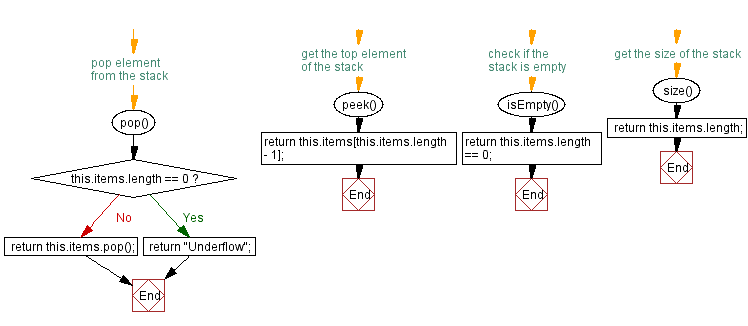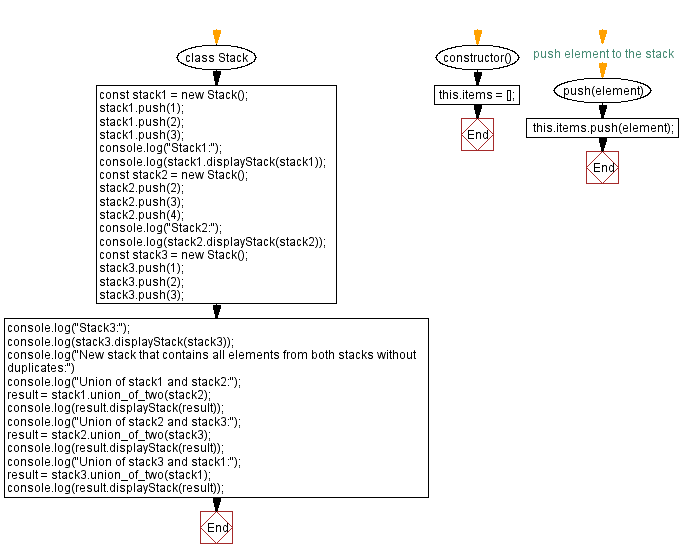JavaScript Exercises: Elements from both stacks without duplicates
JavaScript Stack: Exercise-30 with Solution
Union of Two Stacks
Write a JavaScript program that implements a stack and creates a new stack that contains all elements from both stacks without duplicates.
Sample Solution:
JavaScript Code:
class Stack {
constructor() {
this.items = [];
}
// push element to the stack
push(element) {
this.items.push(element);
}
// pop element from the stack
pop() {
if (this.items.length == 0) {
return "Underflow";
}
return this.items.pop();
}
// get the top element of the stack
peek() {
return this.items[this.items.length - 1];
}
// check if the stack is empty
isEmpty() {
return this.items.length == 0;
}
// get the size of the stack
size() {
return this.items.length;
}
union_of_two(stack2) {
const result = new Stack();
// Add all elements from this stack to the result stack
for (let i = 0; i < this.items.length; i++) {
if (!result.items.includes(this.items[i])) {
result.push(this.items[i]);
}
}
// Add all elements from stack2 to the result stack
for (let i = 0; i < stack2.items.length; i++) {
if (!result.items.includes(stack2.items[i])) {
result.push(stack2.items[i]);
}
}
return result;
}
displayStack(stack) {
console.log("Stack elements are:");
let str = "";
for (let i = 0; i < stack.items.length; i++)
str += stack.items[i] + " ";
return str.trim();
}
}
const stack1 = new Stack();
stack1.push(1);
stack1.push(2);
stack1.push(3);
console.log("Stack1:");
console.log(stack1.displayStack(stack1));
const stack2 = new Stack();
stack2.push(2);
stack2.push(3);
stack2.push(4);
console.log("Stack2:");
console.log(stack2.displayStack(stack2));
const stack3 = new Stack();
stack3.push(1);
stack3.push(2);
stack3.push(3);
console.log("Stack3:");
console.log(stack3.displayStack(stack3));
console.log("New stack that contains all elements from both stacks without duplicates:")
console.log("Union of stack1 and stack2:");
result = stack1.union_of_two(stack2);
console.log(result.displayStack(result));
console.log("Union of stack2 and stack3:");
result = stack2.union_of_two(stack3);
console.log(result.displayStack(result));
console.log("Union of stack3 and stack1:");
result = stack3.union_of_two(stack1);
console.log(result.displayStack(result));
Sample Output:
Stack1: Stack elements are: 1 2 3 Stack2: Stack elements are: 2 3 4 Stack3: Stack elements are: 1 2 3 New stack that contains all elements from both stacks without duplicates: Union of stack1 and stack2: Stack elements are: 1 2 3 4 Union of stack2 and stack3: Stack elements are: 2 3 4 1 Union of stack3 and stack1: Stack elements are: 1 2 3
Flowchart:



Live Demo:
See the Pen javascript-stack-exercise-30 by w3resource (@w3resource) on CodePen.
For more Practice: Solve these Related Problems:
- Write a JavaScript function that merges two stacks and returns a new stack containing all unique elements from both.
- Write a JavaScript function that combines two stacks by first converting them to sets and then back to a stack.
- Write a JavaScript function that interleaves elements from two stacks to form a union while preserving order.
- Write a JavaScript function that validates the union process by ensuring no duplicate elements exist in the resulting stack.
Go to:
PREV : Elements in Stack1 Not in Stack2.
NEXT : Stack Symmetric Difference.
Improve this sample solution and post your code through Disqus
What is the difficulty level of this exercise?
Test your Programming skills with w3resource's quiz.
